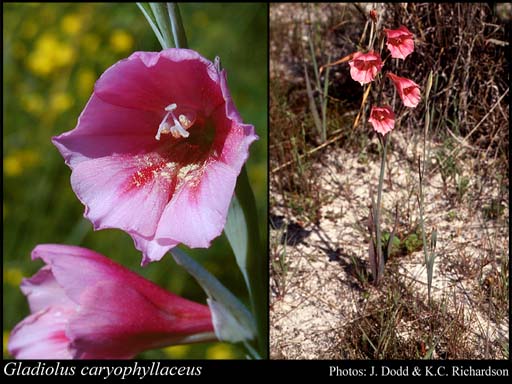- Reference
- Lam., Encycl. Suppl. 2:795 (1812)
- Conservation Code
- Not threatened
- Naturalised Status
- Alien to Western Australia
- Name Status
- Current
Cormous, perennial, herb, 0.2-0.8(-1) m high, with twisted leaf blades. Fl. pink, Aug to Nov. Grey or white sand, loam.

Distribution
- IBRA Regions
- Avon Wheatbelt, Geraldton Sandplains, Jarrah Forest, Mallee, Swan Coastal Plain.
- IBRA Subregions
- Dandaragan Plateau, Katanning, Lesueur Sandplain, Northern Jarrah Forest, Perth, Southern Jarrah Forest, Western Mallee.
- Local Government Areas (LGAs)
- Armadale, Bayswater, Beverley, Busselton, Canning, Chittering, Cockburn, Dandaragan, Gingin, Irwin, Kalamunda, Kwinana, Lake Grace, Mandurah, Melville, Moora, Mundaring, Murray, Northam, Perth, Rockingham, Serpentine-Jarrahdale, South Perth, Stirling, Swan, Toodyay, Victoria Park, Wanneroo.
Management Notes (for the Swan NRM Region)
General Biology. Growth form. Geophyte. Life form. Annually renewed corm, some dormancy between fire. Reproduction. Primarily seed, occasionally offsets. Dispersal. Wind. Seedbank persistence. Medium, 1-5 years. Fire response. Generally survives fire. Fire can bring corms out of dormancy and stimulate prolific flowering.
Notes. Endangered in South Africa. As it flowers particularly well following fire, seedling recruitment in the seasons following fire could be very high.
Additional information. Origin. South Africa. History of use/introduction. Garden escape.
Suggested method of management and control. Wipe individual leaves with glyphosate 10 % or spray dense infestations in degraded areas with 1% glyphosate just on flowering at corm exhaustion. Read the manufacturers' labels and material safety data sheets before using herbicides. For further information consult the Australian Pesticides and Veterinary Medicines Authority to determine the status of permits for your situation or state.
Management Calendar
| Calendar Type | Jan | Feb | Mar | Apr | May | Jun | Jul | Aug | Sep | Oct | Nov | Dec | Comments |
|---|---|---|---|---|---|---|---|---|---|---|---|---|---|
| Dormant | Y | Y | Y | ||||||||||
| Active Growth | Y | Y | Y | Y | Y | Y | Y | Y | Y | ||||
| Flowering | Y | Y | Y | ||||||||||
| Fruiting | Y | Y | Y | ||||||||||
| Optimum Treatment | Y | Y | Y |
Legend: Y = Yes, regularly, O = Occasionally, U = Uncertain, referred by others but not confirmed.
References
- Brown, K. & Brooks, K. (2002) Bushland Weeds: A Practical Guide to their Management. Environmental Weeds Action Network, Greenwood.
- Du Plessis, N. & Duncan G. (1989) Bulbous plants of Southern Africa. Tafelberg Publishers Ltd, Cape Town, South Africa.
- Goldblatt, P. & Manning, J. (1998) Gladiolus in Southern Africa. Fernwood Press, Vlaeberg, South Africa.
- Hocking, P.J. (1992) Seasonal dynamics of the accumulation, distribution and redistribution of dry matter and mineral nutrients in a weedy species of Gladiolus (Gladiolus caryophyllaceus). Annals of Botany, 71: 495-509.
- Hussey, B.M.J., Keighery, G.J., Dodd, J., Lloyd, S.G. & Cousens, R.D. (2007) Western Weeds. A guide to the weeds of Western Australia. 2nd Edition. The Plant Protection Society of Western Australia, Victoria Park.